MercoPress. South Atlantic News Agency
Tag: International Monetary Fund, IMF
-
Wednesday, May 8th 2019 - 12:54 UTC
IMF mission arrives in Argentina: Central bank policy, inflation and revenue in the agenda

A new IMF mission is expected in Argentina this e Wednesday for the fourth review of the country's economic plan which is supported by a 36 month stand-by credit from the multilateral financial institution. It's the first IMF visit since Argentina's Central Bank major strategy change in the foreign exchange market to avoid another meltdown of the Argentine currency.
-
Wednesday, May 1st 2019 - 02:49 UTC
The Argentine Peso responds to central bank measures sponsored by the IMF
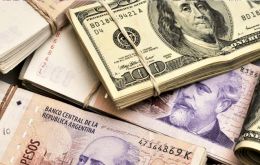
Argentina’s embattled peso currency gained briefly against the dollar on Tuesday after the central bank announced measures aimed at controlling volatility of the currency amid a grinding recession.
-
Saturday, April 13th 2019 - 07:09 UTC
France calls for more Euro solidarity, otherwise the EU project is “unsustainable”
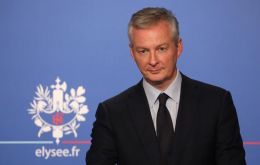
Widening differences over economic policy among Euro area countries are “unsustainable” and could undermine the currency union itself, French Finance Minister Bruno Le Maire said on Friday.“There isn't enough solidarity in the Euro-zone,” Le Maire told reporters on the sidelines of the International Monetary Fund and World Bank Spring meetings.
-
Friday, April 12th 2019 - 09:49 UTC
IMF: “foolish” for Argentine presidential candidates to abandon the program
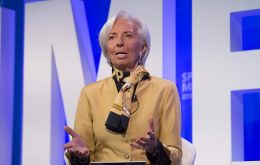
Argentina’s economic reform program is beginning to show results, so it would “foolish” for presidential candidates to abandon the program, International Monetary Fund chief Christine Lagarde said Thursday.
-
Thursday, April 4th 2019 - 09:43 UTC
Argentina requests waiver ahead of IMF's third review to further release funds

Argentina has requested a waiver from the International Monetary Fund as some data would not be available in time for the fund's third review this week of US$ 56.3 billion in standby financing agreed last year, a Treasury spokesman said on Wednesday.
-
Tuesday, March 19th 2019 - 06:16 UTC
IMF commends Argentina's stabilization efforts, releases next US$ 10.8bn, but also demands more austerity
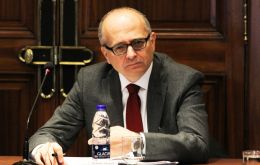
An International Monetary Fund (IMF) mission led by Mr. Roberto Cardarelli visited Argentina during February 11–22, 2019 to conduct discussions on the Third Review of Argentina’s IMF-supported program under the Stand-By Arrangement (SBA). Talks continued in Washington DC after the end of the mission.
-
Saturday, January 12th 2019 - 10:34 UTC
Excessive high-risk premium for Argentine assets, claims Macri official

Investors have placed an excessively high-risk premium on Argentine assets compared to their peers, according to Finance Secretary Santiago Bausili, quoted in a report by Bloomberg. Argentina's country risk rating has been hovering at 7.0 percentage points.
-
Monday, December 3rd 2018 - 06:42 UTC
China boosts Argentina's foreign reserves with a US$ 9 billion currency swap
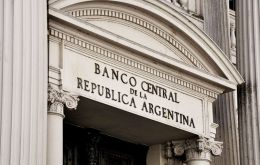
China and Argentina signed a US$ 9 billion currency swap agreement to boost the South American country’s foreign currency reserves, its central bank announced on Sunday.
-
Tuesday, November 20th 2018 - 07:38 UTC
CFK: Macri merely a manager of policies imposed from abroad
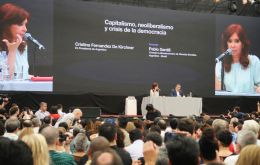
Former Argentine President Cristina Fernández Kirchner (CFK) Monday criticized the administration of her successor Mauricio Macri in a speech that lasted over an hour at the anti-G20 summit in Buenos Aires, saying - among other things - that by taking a loan from the International Monetary Fund (IMF) the current president merely manages what is dictated to him.
-
Thursday, November 15th 2018 - 21:05 UTC
Double victory for Argentina's Macri ahead of the G20 leaders' summit
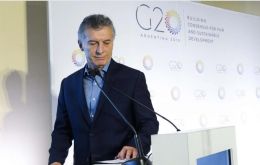
Argentina's Senate on Thursday gave final approval to an unpopular austerity budget designed to meet the stiff requirements of a US$ 57.1 billion International Monetary Fund bailout. Approval came as a great relief for battered president Mauricio Macri, but also a double victory, since it opens the way for his reelection aspirations next year.
